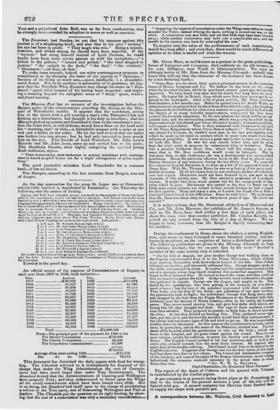During the excitement in Rome about the cholera, a young
English- man, who seems to have belonged to some fanatical society, was bar- barously murdered, on the suspicion of being a distributor of poison. The following particulars are given in the Morning Chronicle as from the victim's brother ; but we suspect that by the term " brother" a member of the same society only is intended.
" On the 15th of August, our poor brother George was walking alone on the Capitol, and descended from it to the Piazza Montanara, where children were amusing themselves with fireworks in honour of the fete. One of them followed our brother, and innocently addressed him. George stopped, spoke to the child, and caressed its cheek. It mother and the neighbours remarked this act of a stranger, whose long beard rendered him somewhat suspected. They began to ding stones at him. Ile turned to know the cause, and they cried out that he wanted to poison the child. At the terrible word arelenatore, the popu- lace gathered in tumult. George saw his danger, and sought to fly. Pro. tected by two gensdarmes, who were passing at the moment, lie was able to reach a house ; but the fury of the populace augmented with their numbers. They broke open the door of the house ; got possession of our poor brother; the gensdarmes took to flight ; the unfortunate George was flung down, strip- ped, dragged by the hair from the Piazza Montanara to the Hospital della Con. solazione, near the descent of Monte Cassino,-that is, for nearly six hundred paces. They never ceased stoning him, and gave him stabs with knives, ton turing him till they thought him dead. The rage of these madmen was Dot even theta satisfied. They proposed to quarter, to hang him, to throw him into the river. At last they decided on burning him. They gathered straw toge- ther,.put him in it, and the horrible sacrifice would have been consummated, if the victim had not shown signs of life and tried to get up. He was immediately trodden down by the crowd. At this moment the gensdarmerie arrived, and by force, by persuasion, and in the name of the Madonna, reached him. The stu- dents of the hospital aided the gensdarmes to take up the body ; which was borne to the hospital, and the gates closed against the crowd. Here he was most anxious, amidst his suffering, to prove his identity and previous life at Ronie. The English Consul assisted at his last moments, and, as well as the entire city, evinced towards him the most lively interest. He expired after eight days of intolerable suffering. The Consul caused him to be buried in the English cemetery. It appears that George was not the first victim of this kiad, but that there were four or five others. The Consul and Ambassador complain of the indolence and want of foresight of the Roman Government, in not taking, beforehand, the measures rendered necessary by the actual state in which Rome then was. " En. W. W. G. Muscat, Chef d'Institution, 39, Boulevard Mont Parnasse." The report of the death of Cabrera and his quarrel with Villareal is contradicted by the Carlist papers. A gas company is at present laying down pipes at St. Petersburg, 80 that in the course of the present autumn a part of the city will be lighted with gas. A second company has likewise been formed there to supply the shops with portable gas.


























 Previous page
Previous page